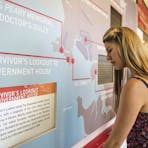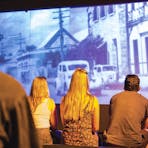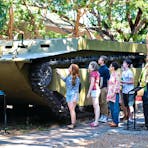Step into the heart of Australia's wartime history at the Darwin Military Museum and Defence of Darwin Experience, where powerful stories and immersive displays bring the events of World War II to life.
Located within the historic East Point Military Precinct, this remarkable site places you right where Australia's northern defences once stood - surrounded by original gun emplacements, military artefacts and sweeping coastal views that once guarded Darwin Harbour.
Inside the Defence of Darwin Experience, explore the Bombing of Darwin Gallery, watch gripping multimedia presentations and hear first-hand accounts from those who lived through the attacks. Then, wander the museum grounds to discover thousands of artefacts - from artillery pieces and vehicles to uniforms, models and artworks - each revealing a unique part of Australia's story at war.
After your visit, relax in the air-conditioned café, browse the museum shop for local and historical gifts, and enjoy the natural beauty of East Point Reserve.
The Darwin Military Museum has deep roots of its own. Established by the Royal Australian Artillery Association (NT) in 1969, following efforts to preserve the site's original wartime structures and artefacts. What began as a small local initiative has grown into one of the Top End's most significant heritage attractions, continuing to honour the people and places that shaped Australia's northern defence.
Opening times
- Sunday:
Entry cost
- Indicative Prices tickets from $15 to $20
Discounts for Seniors over 65 Children under 5 years free entry Discount to serving military personnel - Child tickets from $5 to $10
Facilities
- Café
- Carpark
- Coach parking
- Family-friendly
- Food and refreshments
- Gallery / museum
- Public toilet
- Shop / gift shop
- Free wifi
Accessibility
Welcomes and assists people who have challenges with learning, communication, understanding and behaviour. (includes people with autism, intellectual disability, Down syndrome, acquired brain injury (ABI), dyslexia and dementia) Caters for people who use a wheelchair. Caters for people with sufficient mobility to climb a few steps but who would benefit from fixtures to aid balance. (This includes people using walking frames and mobility aids)
Accreditation
- Quality Tourism Accreditation




/f/286255898790625/eb73ce1477/keep-in-touch.jpg)